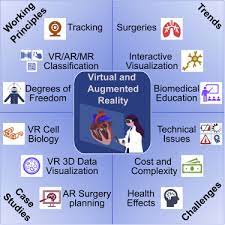Augmented reality (AR) is a technology that adds digital elements to the real world, allowing users to interact with virtual objects and information in real-time. In recent years, AR has gained significant attention in the healthcare industry due to its potential to improve patient outcomes and enhance medical education. In this article, we will explore the advancements and challenges of augmented reality in healthcare.
The Advancements of Augmented Reality in Healthcare
The use of augmented reality in healthcare has already shown promising results in various areas. For instance, AR can improve medical education by providing a more interactive and immersive learning experience. Medical students and healthcare professionals can use AR to visualize complex anatomy and surgical procedures, allowing for more effective training and preparation.
AR can also improve patient outcomes by providing more accurate and efficient diagnosis and treatment. For example, AR can be used in surgery to overlay virtual images onto the patient’s body, providing real-time guidance for the surgeon. This can lead to more precise and effective surgery, reducing the risk of complications and improving patient recovery.
The Challenges of Augmented Reality in Healthcare
While augmented reality has shown great potential in healthcare, there are also several challenges that need to be addressed. One of the main challenges is the cost of implementing AR technology in healthcare. The development and implementation of AR applications can be expensive, and healthcare organizations may not have the necessary financial resources to invest in this technology.

Another challenge is the need for regulatory approval. AR applications used for diagnosis and treatment purposes must be approved by regulatory bodies to ensure patient safety and efficacy. This can be a time-consuming and expensive process, which may hinder the adoption of AR technology in healthcare.
The Ethical and Legal Implications of Augmented Reality in Healthcare
The use of augmented reality in healthcare also raises ethical and legal implications that need to be addressed. For example, the use of AR technology in surgery raises questions about the autonomy and consent of the patient. Patients need to give informed consent for the use of AR technology, and they must be fully aware of the potential risks and benefits.
Another ethical issue is the potential for bias in the development and implementation of AR applications. If the data used to develop AR applications is biased, this can lead to unequal access to healthcare and biased decision-making.
Collaboration and Innovation in Augmented Reality in Healthcare
Collaboration and innovation are also important for the responsible use of augmented reality in healthcare. This includes fostering collaboration between researchers, developers, and healthcare professionals in the development and use of these technologies, as well as promoting innovation in the development of new applications and tools. By working together to develop and use AR in healthcare in a responsible and ethical manner, we can ensure that these technologies are used to benefit society and improve patient outcomes.
Ensuring Accessibility and Inclusivity in Augmented Reality in Healthcare
As augmented reality in healthcare becomes more widespread, it is important to ensure that these technologies are accessible and inclusive for all members of society. This includes ensuring that AR applications in healthcare are designed and used in a way that is accessible to people with disabilities or other accessibility needs. It also includes promoting diversity and inclusivity in the development and use of these technologies, to ensure that they reflect the needs and perspectives of all members of society.
Balancing Innovation and Regulation
The use of augmented reality in healthcare also requires a balance between innovation and regulation. While innovation is essential for the development of new AR applications and tools, it is also important to establish clear regulations and standards for the development and use of these technologies. This includes ensuring that AR systems in healthcare are secure and reliable, as well as providing patients with clear information about the use of AR technology in their diagnosis and treatment.

The Future of Augmented Reality in Healthcare
The future of augmented reality in healthcare is likely to be shaped by ongoing advances in technology, as well as new challenges and opportunities that arise in the coming years. As AR continues to evolve, it is important to remain vigilant and responsive to these changes, and to ensure that these technologies are used in a responsible and ethical manner. By promoting collaboration and innovation, addressing the challenges and risks associated with AR in healthcare, and balancing innovation and regulation, we can help to shape the future of augmented reality in healthcare in a way that benefits society and improves patient outcomes.
Conclusion
The use of augmented reality in healthcare is a new and rapidly growing field that has the potential to transform the way we diagnose, treat, and educate about medical conditions. By providing new opportunities for interaction and visualization, AR can help to improve medical education, diagnosis, and treatment. However, the responsible and ethical use of these technologies requires ongoing attention and consideration, particularly as new challenges and risks emerge.
By promoting collaboration and innovation, addressing the challenges and risks associated with AR in healthcare, and balancing innovation and regulation, we can ensure that the benefits of AR in healthcare are realized while minimizing the risks and challenges. As we continue to navigate the opportunities and challenges associated with the use of AR in healthcare, it is important to remain vigilant and responsive to the evolving needs of society and the
global healthcare system. By doing so, we can harness the full potential of augmented reality in healthcare to improve patient outcomes, enhance medical education, and advance the field of healthcare.
Ultimately, the use of augmented reality in healthcare has the potential to revolutionize the way we approach healthcare and bring about new and innovative solutions to some of the most pressing challenges facing the global healthcare system. By working together to develop and use AR in a responsible and ethical manner, we can ensure that these technologies are used to benefit society and improve patient outcomes, while also addressing the challenges and risks associated with their use. With collaboration, innovation, and a commitment to responsible and ethical development and use, we can unlock the full potential of augmented reality in healthcare and transform the field of healthcare for the better.















